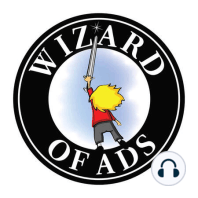2 min listen

“No One Listens to the Radio Anymore”
“No One Listens to the Radio Anymore”
ratings:
Length:
8 minutes
Released:
Apr 30, 2018
Format:
Podcast episode
Description
“Radio is dying.”“Radio is dead.”“My friends and I don’t listen to the radio. We (blah, blah, blah) instead.”“No one listens to the radio anymore, especially in high-tech places like San Francisco, in the heart of Silicon Valley. That’s right, isn’t it?”Isn’t it?A few paragraphs from now, I’m going to tell you exactly how many people we’re reaching in San Francisco each week and precisely how many times the average San Franciscan hears our radio ad.But first, let’s look at why we can trust those numbers.You’ve heard of the Gallup Poll and you’ve heard of the Nielsen Ratings. And of course, you understand scientific survey methodology and statistical analysis.Nielsen measures San Francisco’s radio listening habits continuously, using a sample size of about 2,400 adults.Oh? You say you don’t understand scientific survey methodology and statistical analysis? You didn’t know the Gallup Poll is usually based on just 1,000 interviews? And that those 1,000 persons represent the entire population of the Unites States with a high degree of accuracy?“How can a poll of only 1,004 Americans represent 260 million people with only a 3 percent margin of error?” This is the name of an article you’ll find in the online archives of Scientific American. In that article, Professor Andrew Gelman of the departments of statistics and political science at Columbia University, says, “The margin of error depends inversely on the square root of the sample size.”This is what Professor Gelman is saying: The smaller the universe, the larger the percentage of that universe must be queried. If you want to know the opinions of a universe of 10 people, you’ve got to ask all 10 of them.The larger the universe, the smaller the percentage of that universe must be queried. To accurately measure the opinions of 700 people, you’ve got to ask 250 of them. But a sample size of only 384 persons will measure the opinions of 1,000,000 people with an identical degree of accuracy.When the Gallup organization wants to get nitpickingly accurate, they crank their sample size up to 1,500 persons. And that’s to measure the whole United States.That Nielsen sample of 2,400 persons in San Francisco isn’t looking quite so small anymore, is it? By the way, the annual report of Nielsen Holdings indicates they had revenues of $6,572,000,000 last year. That’s right. Six and a half billion dollars to monitor our listening and viewing habits.I say “monitor” because Nielsen doesn’t trust our memories or our motives. Nielsen gives each of those 2,400 San Franciscans a small, electronic device to carry with them each day. This “Portable People Meter” detects the radio stations to which you listen, and notes the precise times that you listen to each station, each day. This data is uploaded to Nielsen and serves as the basis of their ratings report.Electronic devices don’t lie.Nielsen’s methodology and math are irrefutable and unimpeachable.I say we can trust Nielsen’s numbers. What say you?We recently negotiated a weekly schedule on the broadcast radio stations of San Francisco. That schedule reaches 43% of the total (18+) population of that city an average of 2.7 times each week, 52 weeks a year, at a total cost of 47 cents per person/per year. This means each of more than 2.5 million San Franciscans will hear our full-length message an average of 140 times in 2018. (52 x 2.7 = 140.4)About 50 percent of America spends enough time listening to the radio each week that you can efficiently and affordably reach those customers with sufficient repetition to become a household word, an intimate component of their daily life.This familiarity accelerates and enhances every other effort at selling; email, online,...
Released:
Apr 30, 2018
Format:
Podcast episode
Titles in the series (100)
Helping to Rebuild an Economy by Wizard of Ads Monday Morning Memo